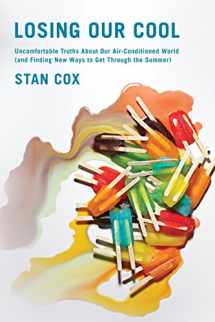
Losing Our Cool: Uncomfortable Truths About Our Air-Conditioned World (and Finding New Ways to Get Through the Summer)
ISBN-13:
9781595584892
ISBN-10:
1595584897
Edition:
1
Author:
Stan Cox
Publication date:
2010
Publisher:
The New Press
Format:
Hardcover
272 pages
Category:
Climatology
,
Earth Sciences
,
Rivers
,
Nature & Ecology
FREE US shipping
on ALL non-marketplace orders
Marketplace
from $30.00
USD
Marketplace offers
Seller
Condition
Note
Seller
Condition
New
Book details
ISBN-13:
9781595584892
ISBN-10:
1595584897
Edition:
1
Author:
Stan Cox
Publication date:
2010
Publisher:
The New Press
Format:
Hardcover
272 pages
Category:
Climatology
,
Earth Sciences
,
Rivers
,
Nature & Ecology
Summary
Losing Our Cool: Uncomfortable Truths About Our Air-Conditioned World (and Finding New Ways to Get Through the Summer) (ISBN-13: 9781595584892 and ISBN-10: 1595584897), written by authors
Stan Cox, was published by The New Press in 2010.
With an overall rating of 3.7 stars, it's a notable title among other
Climatology
(Earth Sciences, Rivers, Nature & Ecology) books. You can easily purchase or rent Losing Our Cool: Uncomfortable Truths About Our Air-Conditioned World (and Finding New Ways to Get Through the Summer) (Hardcover) from BooksRun,
along with many other new and used
Climatology
books
and textbooks.
And, if you're looking to sell your copy, our current buyback offer is $0.54.
Description
Losing our Cool shows how indoor climate control is colliding with an out-of-control outdoor climate. In America, energy consumed by home air-conditioning, and the resulting greenhouse emissions, have doubled in just over a decade, and energy to cool retail stores has risen by two-thirds. Now the entire affluent world is adopting the technology. As the biggest economic crisis in eighty years rolls across the globe, financial concerns threaten to shove ecological crises into the background. Reporting from some of the world’s hot zonesfrom Phoenix, Arizona, and Naples, Florida, to southern IndiaCox documents the surprising ways in which air-conditioning changes human experience: giving a boost to the global warming that it is designed to help us endure, providing a potent commercial stimulant, making possible an impossible commuter economy, and altering migration patterns (air-conditioning has helped alter the political hue of the United States by enabling a population boom in the red-state Sun Belt).
While the book proves that the planet’s atmosphere cannot sustain even our current use of air-conditioning, it also makes a much more positive argument that loosening our attachment to refrigerated air could bring benefits to humans and the planet that go well beyond averting a climate crisis. Though it saves lives in heat waves, air-conditioning may also be altering our bodies’ sensitivity to heat; our rates of infection, allergy, asthma, and obesity; and even our sex drive. Air-conditioning has eroded social bonds and thwarted childhood adventure; it has transformed the ways we eat, sleep, travel, work, buy, relax, vote, and make both love and war. The final chapter surveys the many alternatives to conventional central air-conditioning. By reintroducing some traditional cooling methods, putting newly emerging technologies into practice, and getting beyond industrial definitions of comfort, we can make ourselves comfortable and keep the planet comfortable, too.
While the book proves that the planet’s atmosphere cannot sustain even our current use of air-conditioning, it also makes a much more positive argument that loosening our attachment to refrigerated air could bring benefits to humans and the planet that go well beyond averting a climate crisis. Though it saves lives in heat waves, air-conditioning may also be altering our bodies’ sensitivity to heat; our rates of infection, allergy, asthma, and obesity; and even our sex drive. Air-conditioning has eroded social bonds and thwarted childhood adventure; it has transformed the ways we eat, sleep, travel, work, buy, relax, vote, and make both love and war. The final chapter surveys the many alternatives to conventional central air-conditioning. By reintroducing some traditional cooling methods, putting newly emerging technologies into practice, and getting beyond industrial definitions of comfort, we can make ourselves comfortable and keep the planet comfortable, too.


We would LOVE it if you could help us and other readers by reviewing the book
Book review

Congratulations! We have received your book review.
{user}
{createdAt}
by {truncated_author}


